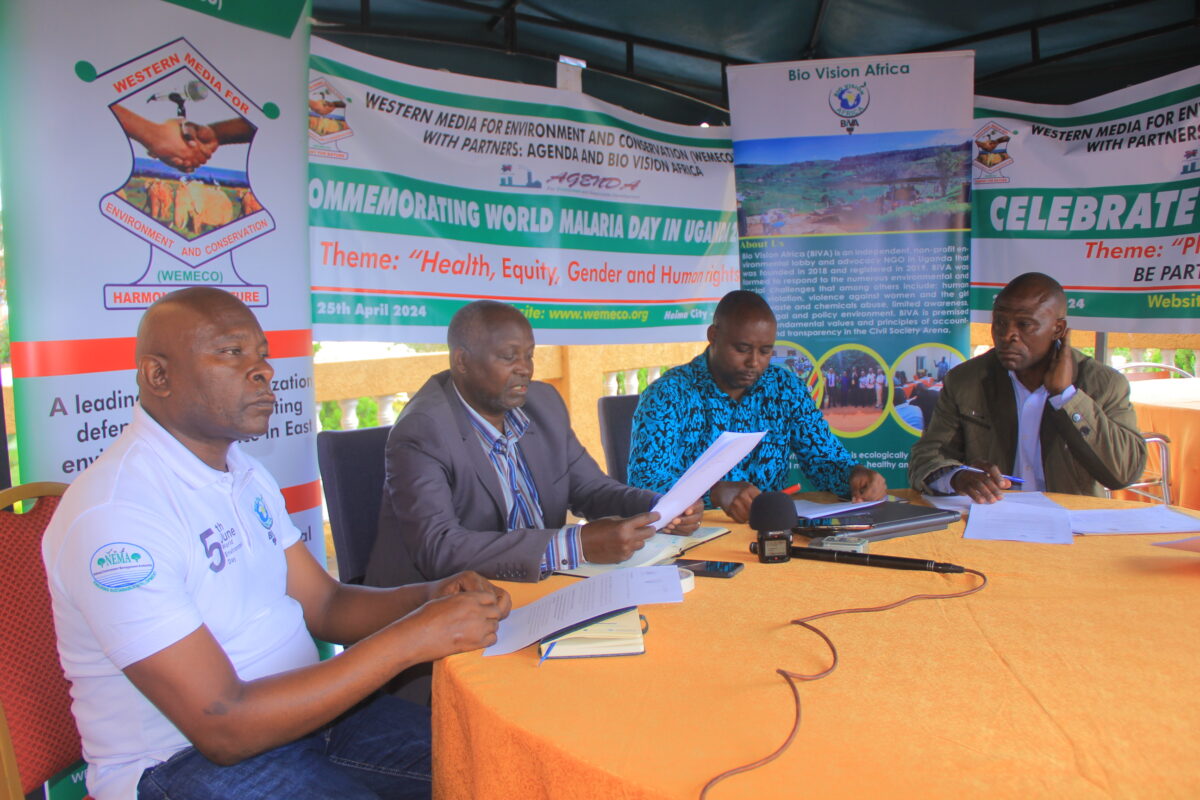Environmental experts are rooting for mass sensitisation of schools in Hoima city, all aimed at teaching them the importance of conserving the environment, while using the same avenues to fight against malaria in the region.
Peter Akugizibwe Araali, the Executive Director of Western Media for Environment and Conservation, (WEMECO), said children should be taught about the importance of mitigating negative effects of climate change
“Residents need to stop irregular disposal and burning of plastics waste due to the horrendous environmental and health implications they pose,”Akugizibwe said while delivering their message to commemorate Earth Day and World Malaria Day at Glory Summit Hotel in Hoima City, on April 24.
Geoffrey Kamese, the Executive Director of Bio Vision Africa (BIVA), a Kampala-based organisation whose work revolves around conservation of environment, said poor countries are grappling with rising temperatures and shifting weather patterns which eventually cause negative effects such as floods, hence causing water to stagnate and bush to grow rapidly.
“These are renowned to be breeding grounds for mosquitoes that transmit malaria. Heat waves and drought breeds more resistant mosquitoes because they adapt and change in behaviour,”Kamese said.
He said leaders need to prioritise climate action as critical in malaria control efforts through broadening the meaning of conserving nature, while emphasising on aspects such as use of renewable energy, enhancing civic engagement and mobilising communities to plant trees.
Kamese said malaria remains Uganda’s leading cause of death, claiming mostly lives of children under five while causing trauma to the affected mothers.
Quoting World Health Organisation (WHO) statistics, he said Uganda has one of the highest global burden of malaria cases, with over 90% of the population at risk.
It causes immense detrimental health effects and is responsible for 30 to 50% of out-patient visits and 15 to 20% of hospital admissions.
The average economic loss in Uganda due to malaria annually was estimated at over $500m. In 2022, WHO reported that there were an estimated 12.7 million malaria cases and over 17,556 deaths in the country.
Kamese also expressed concern over abuse of mosquito nets by some people for fishing and fencing their crops against poultry and covering their birth rooms.
The ecologists called for increased investments in sustainable initiatives and implementation of policies that reduce greenhouse emissions, getting rid of stagnant water and raise awareness on usage of insecticide treated mosquito nets.
Dr. Erin A. Mordecai (PhD) in Lancet Planetary Health Journal in September, 2020, argues that climate change will affect vector-borne disease transmission because changes in temperature affect vector population size, biting, survival, pathogen incubation rates, and vector competence.
The ecologists emphasised a 19 century method in fighting spread of mosquitoes which are the leading transmitters of malaria introduced by Ronald Ross, a British doctor of Indian extraction.
Ross promoted the screening of homes, clearing of bushes around homesteads, sleeping under nets and the draining of any area where water might lie to rule out any unnecessary breeding grounds for larvae.
After the press briefing, the delegation proceeded to different schools in Hoima City including Hoima Public Primary School and St. James Secondary for sensitisation sessions and held radio programmes.

